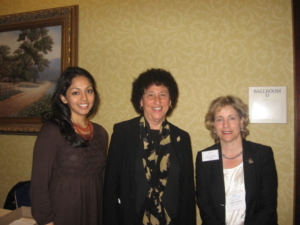by Sally Greenberg, NCL Executive Director
Last month the *TransAtlantic Consumer Dialogue or TACD convened for its 9th annual meeting in Washington DC. TACD is a forum of US and EU consumer organizations that develops and agrees on joint consumer policy recommendations to the US government and European Union to promote the consumer interest in EU and US policy making.
The last day of this lively gathering included a day long meeting: “Generation Excess III conference on obesity and diet-related disease.” The featured speaker, Marion Nestle, was a professor at New York University in the Department of Nutrition, Food Studies, and Public Health and a national expert on the societal impacts of food and nutrition policy.
Nestle’s work is focused on how food marketing influences what children eat. Her slide show presentation is full of enticing photos of food products – many of them that have sugar as their main ingredient – which are offered to children as “healthy” snacks or meals. The more health and nutrition claims the food makes, Nestle says, the more calories the food probably has.
Nestle described how food companies lobby officials, co-opt experts, and expand sales by marketing to children, members of minority groups, and people in developing countries.
The sad truth is that our food policy is influenced more by our big food conglomerates racking up billions in sales than concerns about the health of Americans. The easy availability of high calorie, high fat, high sugar foods means greater obesity, diabetes, heart disease, stroke, cancer –the leading causes of death and disability in the United States. This is having serious consequences in cities and towns across the United States.
Recently, the Washington Post featured a story from Radford, Virginia, a rural area where there’s been a sharp drop in life expectancy for women. In 1983, the life expectancy in the Radford area was 84 years. By 1999, it had dropped to 78 years. A local doctor described the risk factors for women as the “Five F’s: female, forty, fertile, fair, and fat.”
Several of the women interviewed for the story suffer from serious obesity, and diseases related to poor diet and smoking. One of the women had a younger sister who died at age 56 weighing 350 pounds.
Which brings us back to Marion Nestle’s work on obesity and the costs of overweight to the society as a whole. The estimated figure is $117 billion a year. The cost of type 2 diabetes alone is simply staggering to contemplate. And as Nestle points out, we’re seeing type 2 diabetes in young children, where it has rarely been seen before.
Her advice to consumers who want to shop healthy:
- Shop the perimeters of the market. That’s where the real foods are — the meat, produce, dairy.
- Don’t go into the center aisles. But if you have to, don’t buy anything with more than five ingredients, not counting vitamins.
- If you can’t pronounce an ingredient, don’t buy the product.
- Don’t buy anything with a health claim — they’re misleading.
- Don’t buy artificial anything.
- Don’t buy anything with a cartoon on it — these people are marketing directly to your child.
*Links are no longer active as the original sources have removed the content, sometimes due to federal website changes or restructurings.















